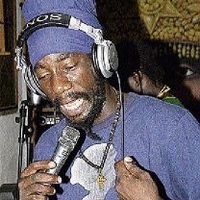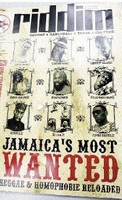Lost in translation? - Citing cultural ignorance, European music experts say gay rights groups have gone too far
Published: Saturday | August 1, 2009

Jamaican artistes have a strong presence on the covers of German magazines Spex and Riddim.
German radio disc jock Andreas Müller has criticised European and North American gay and lesbian rights groups for what he calls a coordinated campaign to tarnish reggae and dancehall music.
The 44-year-old, who doubles as an entertainment writer and has a vast library of some 15,000-20,000 reggae works - mainly on vinyl - in his Berlin home office, told Saturday Life in a recent interview that gay rights lobbyists have missed the mark by viewing dancehall's vitriolic lyrics as a literal rallying cry for bloodletting.
"They had no idea about reggae culture, about anything at all. No one went to Jamaica to learn (and understand)," said Müller of the lobbyists.
"It's really sad. This damaged the careers of artistes very badly because no one wanted to touch Jamaican artistes," he said, referring to the cancellation of shows featuring blacklisted performers.
wave of fear
Müller, known in media circles as Admiral Tuff, said groups such as OutRage!, of which Briton Peter Tatchell is a member, had deliberately sought to exploit European xenophobia to spread a wave of fear that black entertainers who promoted homophobia would have a disruptive social influence.
"Peter Tatchell is a racist!" said Müller.
Tatchell, in an email interview with Saturday Life yesterday, rubbished Müller's claims. He said race was not a factor in his campaigns as he had fought against the apartheid movement in segregated South Africa for more than 20 years and supported anticolonialism in the Caribbean.
"We only target eight out of hundreds of Jamaican singers. It is because they incite homophobic violence and murder. We have done this at the behest of Jamaican gay and human rights campaigners (who) have said that this music is unacceptable and contributes to a climate of hatred and violence against gay Jamaicans."
He added: "The claim that I am racist is nonsense. I have a 40-year record of campaigning against racism, and I am often attacked both verbally and physically by racist thugs because I have defended black communities."
jamaicans long history
Jamaican artistes have had a long history of pushing the envelope with biting rhetoric and have suffered dire economic consequences. The popularity of dancehall deejay Shabba Ranks, an iconic star of the late 1980s and early '90s, plummeted after he poured scorn on homosexuality on a television show.
Buju Banton, whose controversial 1993 hit song Boom Bye Bye was viewed by some persons as an endorsement of anti-gay violence, is still struggling to escape those ghosts. Banton played a gig in Berlin in June, after years of travel or performance bans imposed by the German government. Even now, his music is still banned from many radio stations across Germany, said Müller.
The lesbian, gay, bisexual and transgender movement has even labelled a collaboration between Jamaican artiste Sizzla and German singer Gentleman 'murder music', said Müller, who played reggae, pop and funk on his programme 'Dubsolution' for more than 10 years on Radio Eins.
Animosity against homosexuality is virulent in Jamaica, a fact that has sparked concern by rights organisations like Amnesty International, which say violence against gays is entrenched in society. Buggery is still on the law books and the Church passionately preaches that homosexual orientation is sinful and abnormal.
Pete Lilly and Ellen Köhlings, editors of Cologne-based Riddim magazine, argue that European audiences won't go wielding hatchets through the streets like Pavlov's dogs when they hear homophobic music.
"(Germans) are, in general, I would say, more tolerant of a gay lifestyle than Jamaicans. But I think most of them have learned to understand that reggae artistes are different, their views are different," said Lilly, whose bimonthly magazine has a circulation of 45,000.
"I never experienced anyone booing a b-man show, not here in Germany, but it doesn't mean the audience agrees with what is said. It's just kinda just living with the contradiction. They think they can stop homophobia in Jamaica, but they can (only) stop the artistes."
life inspiring art
Köhlings, who disagrees with the promotion of anti-gay sentiments, said headline screamers like "the hate singers are back in town" do little to establish common ground between the factions. She believes homophobic music is more a case of art reflecting life.
"It's the consensus in Jamaica and the music always reflects the society in Jamaica. They cannot just blame artistes," she said.
Jan Kedves, an editor of Spex magazine which is headquartered in one of Berlin's boroughs, said despite an about-face by Jamaican artistes in steering clear of anti-gay themes, entertainers would only gain true credibility if they publicly denounced anti-gay violence.
"The problem is that everyone has different opinions and points of view," said Kedves, a migrant from Eastern Europe.
"The difficulty that gay and lesbian groups have is that dancehall music is so drastic, not only from a moral point of view, it's about killing people. I can understand why Germans don't want these sorts of singers to be on stage without discussion."
Eric Reiss, a selector on Bandolero sound system, believes that German authorities would gain more traction in trying to win the hearts and minds of gay-bashing cultures through suasion instead of the strong-arm tactics of travel bans. In his opinion, state strategies have been "like putting oil in fire".
"To tell artistes from Jamaica that you should not say b-boy lyrics is wrong, it's getting the people angry," said Reiss, who has also toured Africa and the Caribbean with his sound.
"You have to hit the problem at the roots, do school projects and teach people that it's not wrong to be gay."
But Müller, who said gays are sometimes attacked in rural German villages or commit suicide to escape discrimination, urged Europe to focus on eliminating homophobic stigma in its own backyard before targeting other nations.
His claims are backed by a European Union Agency for Fundamental Rights report published in April which said discrimination and deadly violence were rampant across the continent.
"Many LGBT persons experience discrimination, bullying and harassment. There have been physical attacks and even deadly assaults" in some European countries, the Austria-based agency's director, Morten Kjaerum, was quoted as saying. "These are alarming signals in an EU that prides itself on its principles of equal treatment and non-discrimination," Kjaerum added.

Pete Lilly and Ellen Köhlings in Riddim magazine's small office in Cologne, Germany. - Photo by Andre Wright

Andreas Müller shows some of the vinyl records in his collection which his estimates put at 15,000-20,000. - Photo by Andre Wright

Sizzla has been one of many Jamaican artistes who have suffered show cancellations because of anti-gay works. - File

The cover of Riddim magazine's April/May 2009 edition focusing on Jamaican artistes who have been targeted for homophobic lyrics. - Photo by Anthony Minott
andre.wright@gleanerjm.com
